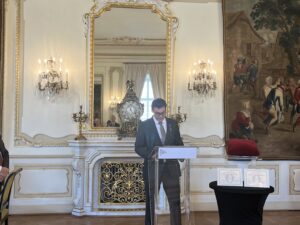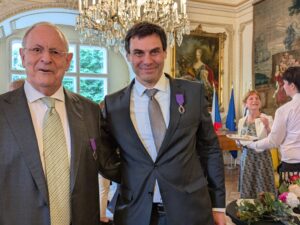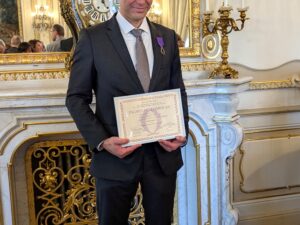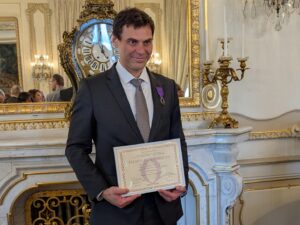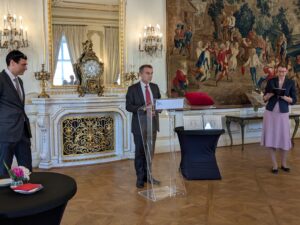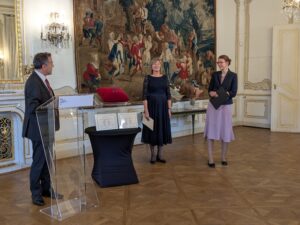Dr. Ing. Josef Šivic, a leading Czech scientist in the field of artificial intelligence and computer vision, has received a significant honor. On June 6, at a formal ceremony at the French Embassy in Prague, he was awarded the Order of Academic Palms (Ordre des Palmes académiques) by the French Ambassador to the Czech Republic, Stéphane Crouzat. This distinction is awarded for contributions to the development of education and scientific cooperation with France.
Josef Šivic is a senior researcher at the Czech Institute of Informatics, Robotics and Cybernetics at CTU (CIIRC CTU), where he leads the research team focused on machine perception and artificial intelligence. He holds an ERC Advanced Grant, serves as the director of ELLIS Unit Prague, leads the AICzechia initiative, and received the Czech AI Award for research and development in 2023.
“Dr. Ing. Josef Šivic is a key figure in French-Czech cooperation in computer science, particularly in artificial intelligence and computer vision. Following a long and fruitful collaboration with the French National Institute for Research in Digital Science and Technology (Inria), this outstanding scientist played a vital role in launching the European CLARA project, involving the Paris Brain Institute, which applies AI and quantum computing in the study of neurological diseases. It is my honor to present him with the Order of Academic Palms on behalf of the French Minister of Education, Higher Education, and Research,” said French Ambassador to the Czech Republic Stéphane Crouzat during the ceremony.
Josef Šivic’s research is deeply rooted in international cooperation—especially with France, where he spent many years at the Inria research center in Paris. There, he worked at a joint research laboratory of the Department of Computer Science at École Normale Supérieure, PSL Research University, and CNRS, and held the AI Chair at the PRAIRIE Institute. These ties continue through joint projects and researcher/student exchanges. Recent results include new AI tools for robot learning developed with Inria, PRAIRIE, and the LAAS-CNRS lab in Toulouse, as well as the newly forming CLARA center for neurodegenerative disease research, involving the Paris Brain Institute and PRAIRIE.
Three years ago, Šivic was also one of the main initiators and coordinators of the first Czech-French workshop focused on artificial intelligence, which brought together over a hundred leading European scientists at the Ministry of Foreign Affairs and CIIRC CTU. One of the key outcomes of that initiative was the CLARA center.
“I am truly honored to receive this award. I see it not only as appreciation for my work, but also as recognition of the collaboration we’ve been able to build in recent years between the Czech Republic and France in the field of artificial intelligence,” Šivic emphasized in his acceptance speech.
The Order of Academic Palms, established by Napoleon Bonaparte in 1808, is one of the oldest civilian honors in France. It is awarded not only to French citizens but also to foreign nationals who have made outstanding contributions to spreading French culture, language, and science. Granting this award to Josef Šivic is not only a personal honor but also a confirmation of the important role Czech science plays in the European and global context.
About Josef Šivic
Dr. Josef Šivic leads the Intelligent Machine Perception and Artificial Intelligence research group at CIIRC CTU in Prague and is the director of ELLIS Unit Prague. Since 2022, he has also chaired the AICzechia initiative, which unites around 40 top academic teams and institutions across Czech universities and research centers through leading AI experts. His team’s work has helped position CTU among the top five European institutions in computer vision (according to CSRankings, 2018–2025), and he is considered one of the leading Czech computer scientists.
After completing his master’s at CTU in 2002, he spent over 15 years abroad, including PhD studies at the University of Oxford (UK), a postdoc at MIT (USA), and more than a decade at Inria in Paris, where he was awarded an ERC Starting Grant. Since 2017, he has worked at CIIRC CTU, where he led the OP VVV IMPACT project (total budget CZK 122.6 million), which enabled him to build an international team. He is the author of over 100 scientific publications, and his work has received major awards such as the Helmholtz Prize and the Longuet-Higgins Prize for fundamental contributions to computer vision. As of 2024, he is leading the ERC Advanced Grant FRONTIER, focused on intelligent computing systems capable of learning in dynamically changing environments.



